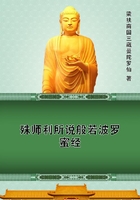And,upon this ground,I affirm that the magistrate's power extends not to the establishing of any articles of faith,or forms of worship,by the force of his laws.For laws are of no force at all without penalties,and penalties in this case are absolutely impertinent,because they are not proper to convince the mind.Neither the profession of any articles of faith,nor the conformity to any outward form of worship (as has been already said),can be available to the salvation of souls,unless the truth of the one and the acceptableness of the other unto God be thoroughly believed by those that so profess and practise.But penalties are no way capable to produce such belief.It is only light and evidence that can work a change in men's opinions;which light can in no manner proceed from corporal sufferings,or any other outward penalties.In the third place,the care of the salvation of men's souls cannot belong to the magistrate;because,though the rigour of laws and the force of penalties were capable to convince and change men's minds,yet would not that help at all to the salvation of their souls.
For there being but one truth,one way to heaven,what hope is there that more men would be led into it if they had no rule but the religion of the court and were put under the necessity to quit the light of their own reason,and oppose the dictates of their own consciences,and blindly to resign themselves up to the will of their governors and to the religion which either ignorance,ambition,or superstition had chanced to establish in the countries where they were born?In the variety and contradiction of opinions in religion,wherein the princes of the world are as much divided as in their secular interests,the narrow way would be much straitened;one country alone would be in the right,and all the rest of the world put under an obligation of following their princes in the ways that lead to destruction;and that which heightens the absurdity,and very ill suits the notion of a Deity,men would owe their eternal happiness or misery to the places of their nativity.These considerations,to omit many others that might have been urged to the same purpose,seem unto me sufficient to conclude that all the power of civil government relates only to men's civil interests,is confined to the care of the things of this world,and hath nothing to do with the world to come.Let us now consider what a church is.
A church,then,I take to be a voluntary society of men,joining themselves together of their own accord in order to the public worshipping of God in such manner as they judge acceptable to Him,and effectual to the salvation of their souls.I say it is a free and voluntary society.Nobody is born a member of any church;otherwise the religion of parents would descend unto children by the same right of inheritance as their temporal estates,and everyone would hold his faith by the same tenure he does his lands,than which nothing can be imagined more absurd.Thus,therefore,that matter stands.No man by nature is bound unto any particular church or sect,but everyone joins himself voluntarily to that society in which he believes he has found that profession and worship which is truly acceptable to God.The hope of salvation,as it was the only cause of his entrance into that communion,so it can be the only reason of his stay there.For if afterwards he discover anything either erroneous in the doctrine or incongruous in the worship of that society to which he has joined himself,why should it not be as free for him to go out as it was to enter?No member of a religious society can be tied with any other bonds but what proceed from the certain expectation of eternal life.A church,then,is a society of members voluntarily uniting to that end.It follows now that we consider what is the power of this church and unto what laws it is subject.Forasmuch as no society,how free soever,or upon whatsoever slight occasion instituted,whether of philosophers for learning,of merchants for commerce,or of men of leisure for mutual conversation and discourse,no church or company,I say,can in the least subsist and hold together,but will presently dissolve and break in pieces,unless it be regulated by some laws,and the members all consent to observe some order.Place and time of meeting must be agreed on;rules for admitting and excluding members must be established;distinction of officers,and putting things into a regular course,and suchlike,cannot be omitted.But since the joining together of several members into this church-society,as has already been demonstrated,is absolutely free and spontaneous,it necessarily follows that the right of making its laws can belong to none but the society itself;or,at least (which is the same thing),to those whom the society by common consent has authorised thereunto.Some,perhaps,may object that no such society can be said to be a true church unless it have in it a bishop or presbyter,with ruling authority derived from the very apostles,and continued down to the present times by an uninterrupted succession.
To these I answer:In the first place,let them show me the edict by which Christ has imposed that law upon His Church.And let not any man think me impertinent,if in a thing of this consequence I require that the terms of that edict be very express and positive;for the promise He has made us (Matt.18.20),that "wheresoever two or three are gathered together"in His name,He will be in the midst of them,seems to imply the contrary.Whether such an assembly want anything necessary to a true church,pray do you consider.Certain I am that nothing can be there wanting unto the salvation of souls,which is sufficient to our purpose.Next,pray observe how great have always been the divisions amongst even those who lay so much stress upon the Divine institution and continued succession of a certain order of rulers in the Church.Now,their very dissension unavoidably puts us upon a necessity of deliberating and,consequently,allows a liberty of choosing that which upon consideration we prefer.And,in the last place,I consent that these men have a ruler in their church,established by such a long series of succession as they judge necessary,provided I may have liberty at the same time to join myself to that society in which I am persuaded those things are to be found which are necessary to the salvation of my soul.In this manner ecclesiastical liberty will be preserved on all sides,and no man will have a legislator imposed upon him but whom himself has chosen.But since men are so solicitous about the true church,I would only ask them here,by the way,if it be not more agreeable to the Church of Christ to make the conditions of her communion consist in such things,and such things only,as the Holy Spirit has in the Holy Scriptures declared,in express words,to be necessary to salvation;I ask,I say,whether this be not more agreeable to the Church of Christ than for men to impose their own inventions and interpretations upon others as if they were of Divine authority,and to establish by ecclesiastical laws,as absolutely necessary to the profession of Christianity,such things as the Holy Scriptures do either not mention,or at least not expressly command?
Whosoever requires those things in order to ecclesiastical communion,which Christ does not require in order to life eternal,he may,perhaps,indeed constitute a society accommodated to his own opinion and his own advantage;but how that can be called the Church of Christ which is established upon laws that are not His,and which excludes such persons from its communion as He will one day receive into the Kingdom of Heaven,I understand not.But this being not a proper place to inquire into the marks of the true church,I will only mind those that contend so earnestly for the decrees of their own society,and that cry out continually,"The Church!the Church!"with as much noise,and perhaps upon the same principle,as the Ephesian silversmiths did for their Diana;this,I say,I desire to mind them of,that the Gospel frequently declares that the true disciples of Christ must suffer persecution;but that the Church of Christ should persecute others,and force others by fire and sword to embrace her faith and doctrine,I could never yet find in any of the books of the New Testament.The end of a religious society (as has already been said)is the public worship of God and,by means thereof,the acquisition of eternal life.















